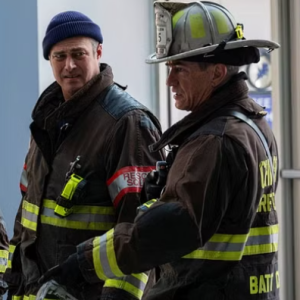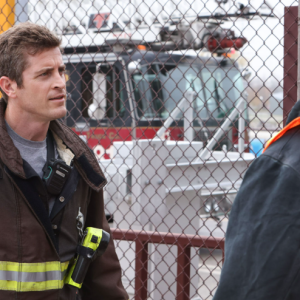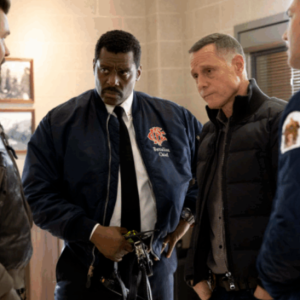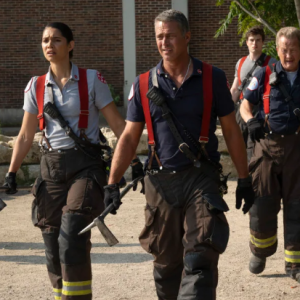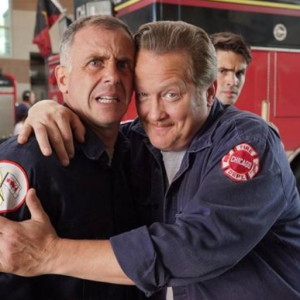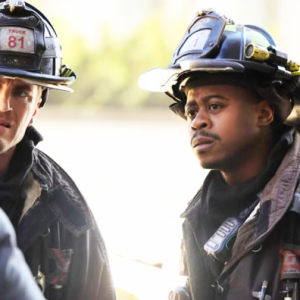For over a decade, Chicago Fire has captivated audiences with high-stakes rescues, unshakable bravery, and the unbreakable bonds of Firehouse 51. At the heart of this blazing drama, Lieutenant Christopher Herrmann has always stood as one of the most dependable pillars—tough yet relatable, heroic yet grounded in everyday struggles. But as Season 14 dawns, Herrmann finds himself at one of the most punishing crossroads of his career. What looked like a noble sacrifice in the Season 13 finale has spiraled into a storm of professional regression and financial stress. On the surface, all signs seem to point toward the mysterious Chief Dom Pascal as the antagonist in Herrmann’s story. Yet when we peel back the layers of history, the painful truth emerges: the man truly responsible for Herrmann’s turmoil is none other than his longtime mentor, Wallace Boden. This isn’t just another clash at the firehouse; it’s the heartbreaking consequence of a decision planted seasons ago and now erupting into full-blown crisis.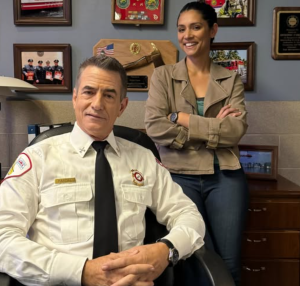
The defining moment came in Season 13, when Herrmann stunned both his colleagues and the audience by stepping down from his role as Lieutenant of Engine 51. His reasoning was heartfelt: he gave up his position so that his best friend, Mouch, could finally take the Lieutenant’s test and achieve the dream he had carried his entire career. It was a profoundly moving display of loyalty, perfectly in character for Herrmann, the selfless “big brother” of Firehouse 51. But beneath the beauty of that gesture lay devastating consequences. By relinquishing his rank, Herrmann also surrendered a substantial paycheck, a crushing blow for a man raising a large family. What seemed like an honorable act of brotherhood quickly turned into a professional and financial backslide. In truth, Herrmann didn’t just sacrifice his title; he sacrificed stability, security, and the dignity of the leadership role he had worked so hard to earn. The applause of that selfless moment will soon fade, replaced by the harsh reality of what he has lost.
For fans, the obvious culprit was Pascal. Introduced after Boden’s departure, Pascal immediately radiated suspicion: cold, moody, and carrying a shadowy past, he disrupted the family-like balance of Firehouse 51. His constant clashes with Herrmann only seemed to confirm the narrative that he was the barrier standing in the way of Herrmann becoming Chief—a role everyone assumed was his destiny. To viewers, Pascal was the perfect villain, swooping in to steal what rightfully belonged to a beloved original member. But that interpretation, while convenient, misses the deeper truth. Pascal may have been a temporary obstacle, but he was never the architect of Herrmann’s fall. He was only a surface-level distraction. The true seed of Herrmann’s undoing was planted by a man no one wanted to blame—the firehouse legend himself, Wallace Boden.
The uncomfortable reality is this: Boden set Herrmann on this path. In the Season 12 finale, Boden explicitly told Herrmann that he was the right man to carry the torch, to lead Firehouse 51 into the future. Before that moment, Herrmann had never shown interest in promotion beyond Lieutenant. He was a man defined by action, by being on the frontlines, and by his pride in co-owning Molly’s. Yet Boden reframed the idea of becoming Chief as not just an opportunity but a sacred duty. That burden weighed heavily on Herrmann, pushing him into a career track he never truly wanted. To refuse would have been to let down not just Boden, but the entire family of 51. The sense of obligation boxed Herrmann in, and by the time he faced the choice between holding onto his position or letting Mouch chase his dream, the die had already been cast. His sacrifice, heartbreaking as it was, was the direct consequence of Boden’s pressure. What looked like a beautiful act of friendship was, in truth, the inevitable result of a career path imposed on him by his mentor’s vision, not his own ambition.
Season 14, then, promises a rich vein of drama. Herrmann will now serve under Mouch for the first time in their decades-long partnership, an arrangement that is sure to test their bond. Can Herrmann suppress resentment when the man once under his command now leads him? Can Mouch shoulder the weight of authority while proving himself worthy in Herrmann’s eyes? Add to that the financial strain, the sting of lost rank, and the creeping sense of envy, and Herrmann’s arc transforms into a powder keg of internal conflict. And looming in the distance is Boden’s eventual return—a reunion that will strip away the glossy mentor-student dynamic and replace it with something rawer, more painful. Herrmann may finally confront Boden not as a father figure but as the man who cornered him into sacrifice. That confrontation could become one of the most emotionally explosive storylines in the show’s long history.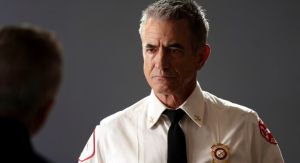
What makes this narrative so powerful is its emotional authenticity. This isn’t drama for drama’s sake; it’s rooted in the complex psychology of loyalty, leadership, and unintended consequences. By shifting the blame from Pascal to Boden, the writers are daring fans to wrestle with the uncomfortable truth that sometimes the people who hurt us most are not our enemies but the ones we trust the most. Herrmann’s dilemma is more than a plot twist—it’s a tragic reflection of how loyalty can turn into a burden, how sacrifice can curdle into regret, and how a hero can be undone not by fire, but by the choices of those he admires. In Season 14, Chicago Fire proves once again why it has endured for so long: because beyond the flames and rescues, it knows how to ignite the deepest, most human conflicts. Pascal may be the scapegoat, but Boden’s shadow is the true fire that Herrmann must walk through—and it promises to burn brighter, and darker, than ever before.
